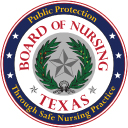Differentiating the Role of the Texas Board of Nursing from the Role of Nursing (Professional) Associations
Although the Texas Board of Nursing and professional nursing associations are both involved in the arena of nursing, nursing associations serve a different purpose and provide different services to their nursing membership and the public.
The Role of the Board of Nursing
The mission of the BON is to protect and promote the welfare of the people of Texas by ensuring that each person licensed as a
nurse is competent to practice safely. For this purpose, the Texas Board of Nursing (BON) is the State agency empowered by the
Texas Legislature with regulating the practice of vocational, professional, and advanced practice nursing...
Board staff frequently receive calls asking if the Board plans to lobby the Texas Legislature or comment on proposed bills that may or may not be favorable to nurses. Staff are also asked to explain why the Board adopts amendments to the Nursing Practice Act on topics such as requiring criminal background checks on nurses.
The Board does not draft legislation, nor can the Board or board staff support or oppose proposed bills during a legislative session. Board Members and Board staff are prohibited from lobbying the legislature regarding any bill that may go before the Texas Legislature and amend the Nursing Practice Act or other statutes, in or outside the authority of the BON, that otherwise impact nurses.
The Nursing Practice Act (Ch. 301), Nursing Peer Review (Ch. 303), Nurse Licensure Compact (Ch. 304), and NCSBN Advanced Practice Registered Nurse Compact (Ch. 305) are all part of the Texas Statutes in the Texas Occupations Code. The Board Rules are part of the Texas Administrative Code (TAC). The Board fulfills its mission of protecting the public by carrying out the applicable statutes in the Occupations Code, and through promulgation of rules in the Administrative Code.
In Texas government, policy making duties are divided between the legislature and the governor. The legislature writes the laws and appropriates the funds for state agency operations. The Governor, the State's Chief Executive Officer, has a major voice in setting the legislative agenda and vetoing bills. However, the legislature and the Governor delegate to state agency boards, like the Board of Nursing, the tasks of carrying out the laws applicable to the profession the agency is responsible for regulating.
The Board meets regularly to execute its responsibilities for administering the law governing nursing practice and education. The Board employs professional and support staff to carry out the provisions of the law along with the policies and regulations established by the Board. The Board pursues its mission by upholding minimum standards for educational programs in nursing educational programs, licensing qualified individuals as nurses, educating licensed nurses regarding changes in the law, investigating alleged violations, and imposing appropriate discipline on the licenses of those found to be in violation of the BON's statutes, rules, and policies.
The Role of Nursing (Professional) Associations
Unlike the BON, a nursing association (also called a professional association) is a private organization whose members must
pay dues to enjoy the benefits of membership. One of the primary functions of a nursing association is to represent its members
in legislative, political, and practice matters. It provides a central voice for its nurse membership...
A nursing association can lobby the legislature and Governor for the interests of its members and the profession of nursing. A nursing association provides a united voice that can speak out on the issues important to a specific area of nursing practice and/or to the nursing profession as a whole. In addition, a nursing association provides leadership in other areas such as improving working conditions and benefits for nurses. A nursing association also may lead the way in developing public health policies.
The Board and the nursing associations have separate but equally important roles. The nursing associations represent their
members, while the Board serves the people of Texas through assuring licensed nurses meet minimum standards of safe practice...
The Board assists nurses to know and conform to minimum standards through rules that implement the statutes, and through additional guidance documents such as position statements, interpretive guidelines, and frequently asked questions available on the web page at http://www.bon.texas.gov.
Policy on Use of Technological Solutions to Improve Board FunctionsPolicy on Use of Technological Solutions to Improve Board Functions
HB 2426 of the 80th Texas Legislative Session required the Board to implement a policy on the 'Use of Technology'. The Board's intent is to deploy technological-based solutions when possible and offer this written policy for consideration...
Current and emerging information technologies have the potential not only to improve administrative efficiencies through greater use of appropriate technological solutions, but perhaps more importantly, to increase the level of governmental services provided to constituents.
Technologies are an indispensable part in determining the quality and accessibility of services at the Board of Nursing. In expanding and improving the use of technologies, the board will make every reasonable effort to perform the following.
- Incorporate Internet solutions in existing functional requirements and determine if regulatory barriers, which limit Internet solutions, are necessary or can be fulfilled though different avenues. New regulations and requirements will be evaluated for technological solutions during the planning process and when appropriate, deployed with an Internet solution at the implementation of the new requirement.
- Streamline administrative and board functions through the implementation of workflow and web processes, decrease the amount of paper documents produced and required, pursue electronic data exchange opportunities with our stakeholders and continue to support current and new collaborative efforts with other state agencies.
- Ensure technology assets are secure, up-to-date, available for use and recoverable. Electronic penetration test, technological disaster recovery scenarios and testing of secondary data sites will be performed and reviewed annually.
- Securing funding for implementation of new technologies, redesign of existing applications, refresh of agency hardware and software and staff training.
- Comply with State technology mandates and recommendations.
- Standards Review and Recommendations Publications (SRRPUB)
- Texas Administrative Code, 201 - 216
- Government Code, 2054
For more information on these and other topics, use the search field at the top right corner of the page. Should you have further questions or are in need of clarification, please feel free to contact the Board.



